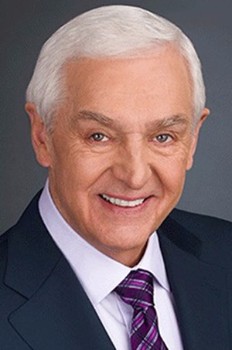EL CAJON, Calif.—During World War II hundreds of thousands of service personnel were spread around the world. When Bing Crosby released a song in October 1943, written as if from a G.I. far away from home at Christmas, it shot up the music charts.
It has remained a Christmas classic ever since:
“I’ll be home for Christmas
You can plan on me
Please have snow and mistletoe
And presents on the tree.
Christmas Eve will find me
Where the love light gleams
I’ll be home for Christmas
If only in my dreams.”
During the war years, I’ll Be Home for Christmas was an anthem for “The Greatest Generation” and has touched hearts every Christmas since. This and other songs remind us: Home is where we want to be at Christmas.

David Jeremiah
Note: “Home” is where we want to be, not just in a house. Most people have seen the original “Home Alone” movie about an 8-year-old boy whose family flies to Paris for Christmas and leaves him “home alone” by mistake.
At first, young Kevin enjoys his newfound freedom as he entertains himself, orders pizza, watches old movies and defeats two bumbling burglars.
But eventually he misses his family. He was in his house for the holidays, but he wasn’t really at home because his family was thousands of miles away. It was only when they returned, once again turning their house into a home, that Christmas became a reminder of what’s most important in life.
Bickering and busyness had caused Kevin’s separation from his family. An argument the previous night had sent Kevin to the attic room alone, and a rushed departure the next morning caused the large family not to notice that he had been left behind. Such problems—and a host of others—can cause us to feel like we’re “home alone” for the holidays as well. Even if we can’t be in our own physical home, it’s important to share the love of Christmas with those who are important in our lives.
Interestingly, almost everyone involved in the first Christmas wasn’t at home for the holidays.
Joseph and Mary had left their home in Nazareth and journeyed to Bethlehem where she gave birth to their baby. The angels who announced the birth of Jesus in the sky over Bethlehem left home to accomplish their mission. And the Magi who traveled to see the newborn king were definitely a long way from home. Perhaps the shepherds “living out in the fields, keeping watch over their flock by night” (Luke 2:8) were the closest to home, presumably being from Bethlehem.
Most important, the baby Jesus was far from His heavenly home.
Leaving the glories of heaven and the eternal company of the Father and Holy Spirit, Jesus came “in the likeness of men” (Philippians 2:7) to a lowly stable in the tiny village of Bethlehem. The reason He and the others were far from their own homes was so we could find our way back to our true home with God.
As wonderful as it is to be at home with family and friends at Christmas, there is still something in us that tells us we are not home yet. As the Bible says, we are “strangers and pilgrims on the earth,” looking for the “heavenly country” that God has prepared for us (Hebrews 11:13,16). Our “expatriate” status adds an extra sense of urgency to creating as much “heaven on earth” as we can during the Christmas season.
Busyness, bickering, budgets, the blues—those and more can steal the joy from the most joyous time of the year. Even if you aren’t in your own house for the holidays, do your best to be home for the holidays by sharing your love for Jesus with family and friends—and especially those who may have few family and friends to be with. Home is about love, generosity, warmth, sharing, hugs, laughter and forgiveness. And because Christmas is about those same things, there is no better place for Christmas than home!
As you celebrate the first coming of Jesus, let the fact that we’re not yet in our true home keep you focused on His second coming—and your eternal, heavenly home. (BP)
David Jeremiah